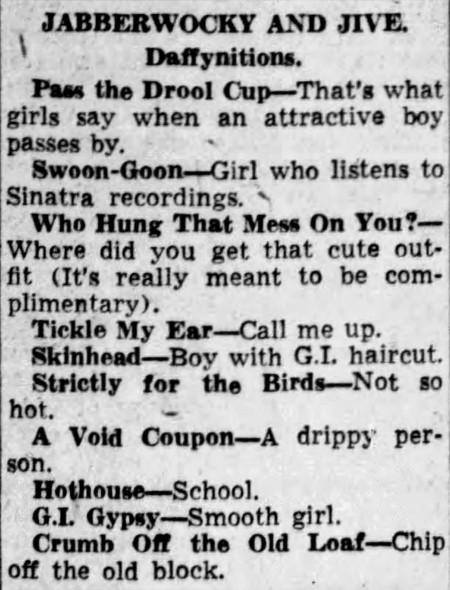CONTENTS
MEANING
EARLY INSTANCES
ORIGIN
The colloquial American-English phrase (strictly) for the birds means worthless, useless, ridiculous, foolish.
This phrase originated in U.S. army slang during the Second World War.
The earliest instance that I have found is from Blitz Hits Army Talk, a glossary of U.S. army slang terms, by Corporal Jimmy Cannon, published in the St. Louis Star-Times (St. Louis, Missouri) of Monday 10th November 1941; here, however, the phrase has a different sense, that of unpleasant news:
Chevrons are “gravy stains” or “venetian blinds.” Unpleasant news “is strictly for the birds.”
The second-earliest occurrence that I have found of strictly for the birds is used in its current sense; it is from Camp Adair Version Tells How to Make Friends in Africa, published in the Corvallis Gazette-Times (Corvallis, Oregon) of Tuesday 9th February 1943:
A booklet distributed to all U.S. military personnel stationed in North Africa has been received at Camp Adair and contains many tips on behavior in Moslem territory.
The booklet has caused some comment and Corporal John J. Gubelman has written the following for the camp newspaper, the Sentry, and the Gazette-Times:
[…]
DON’T
[…]
Don’t kill snakes and birds. Some Arabs believe that the souls of departed chieftains dwell in them. (The editor believes this is strictly for the birds.)
I have found a slightly later occurrence of the phrase which seems to indicate that it soon came to be used among teenagers; it is from Tricks for Teens, by Nancy Pepper, in The Indianapolis Star (Indianapolis, Indiana) of Sunday 12th December 1943:
Jabberwocky and Jive.
Daffynitions.Pass the Drool Cup—That’s what girls say when an attractive boy passes by.
Swoon-Goon—Girl who listens to Sinatra recordings.
Who Hung That Mess On You?—Where did you get that cute outfit (It’s really meant to be complimentary).
Tickle My Ear—Call me up.
Skinhead—Boy with G.I. haircut.
Strictly for the Birds—Not so hot.
A Void Coupon—A drippy person.
Hothouse—School.
G.I. Gypsy—Smooth girl.
Crumb Off the Old Loaf—Chip off the old block.
The earliest occurrence that I have found of the shorter form for the birds (i.e. not preceded by strictly) is from John Pennekamp’s column Behind the Front Page, in The Miami Herald (Miami, Florida) of Friday 28th April 1944:
You probably have learned by reading here that one of my favorite, personal, foreign correspondents is Major Bernal E. Clark, formerly advertising manager of the Florida Power and Light Co., now with the Air Corps in Italy. Writes he:
[…]
Have you ever noticed, too, that the Air Force boys have developed a lot of new words and terms and phrases. Some or most of these are probably strange to the average person back in the States. We got to thinking about these phrases the other day and decided to dig up as many as possible and to give them to Stars and Stripes. I’ll give you a sample glossary of the kind of definitions I mean, for your own education and edification.
[…]
Batting the breeze: When the boys are sitting around in bull session.
ETA: Estimated time of arrival.
Flak Alley: Any section where anti-aircraft guns are concentrated.
Foogle street: Anyone is said to be living on Foogle street when talking nonsense.
For the birds: When you disagree with something, or don’t like it, you say it’s “for the birds,” a polite reference to bird food.
The phrase (strictly) for the birds seems to be a euphemistic shortening of shit for the birds. The following is from GI Lingo, by a certain A. R. Dunlap, published in American Speech (Duke University Press, Durham, North Carolina) of April 1945:
Shit for the birds. Nonsense, drivel, irrelevant matter. (A variant: That’s for the birds. It’s meaningless.)
One Morris Finder gave the most plausible origin of the phrase in For the Birds, published in American Speech of October 1957:
The expression for the birds, now frequent in speech and colloquial writing—an expression descriptive of ideas, schemes, and so on, that are ridiculous, unbelievable, or idiotic—first came to my attention early in 1942, when I entered the U.S. Army. Here the disparaging term that’s for the birds was in common use among officers and enlisted men.
Soldiers from rural areas gave what seems to me to be a plausible explanation of this latter expression: the metaphor alludes to birds eating droppings from horses and cattle [see footnote], a scene common in farm areas and, until recent years, in city alleys. Thus the full expression was an equivalent of the long-established vulgarisms horse shit and bull shit; and the shortened form was a euphemism.
Morris Finder
Fenger High School, ChicagoEditor’s Note: Mr. Finder’s item, though brief, is of unusual value. It rescues—or at least seems to rescue—the origin of an expression from oblivion before the expression gets too old for anyone to know where it came from. If, where it was possible, such things had been done more often, we would now have fewer examples of ‘origin unknown’ in dictionaries.
Interestingly, a French phrase meaning an insignificant thing is de la roupie de sansonnet, where roupie denotes nasal mucus dripping from the nose, and sansonnet denotes a starling—an obsolete variant is de la roupie de singe (singe: a monkey).
Note: In the above-quoted glossary published in The Miami Herald of Friday 28th April 1944, “a polite reference to bird food” probably alludes to “droppings from horses and cattle”.

